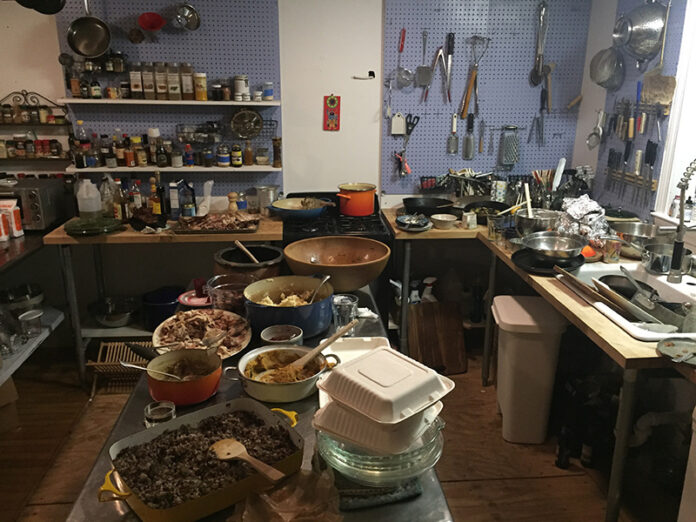It’s my sanctuary and if you want, I’ll share it with you. But you need an invitation. Consider this yours.
Though before you come in, I want to tell you that my kitchen is how I love my family, my friends, my strangers. My muses are the flavors and textures from the raw materials of plant, animal, mineral, fungi. Between the high and low temperatures, the solids and liquids — it’s the steam — the inbetweens and the nuances — that most intrigue me.
But if you think my kitchen isn’t going to be messy, if you expect a tidy mise en place, and that things like my table settings are going to match in neutral colors, you won’t like me, my kitchen or what I cook. My dinner table could very well upset an exacting, rigid and particular sensibility. Still, while there will be disarray — a most delicious disarray — there is a method for which I take full responsibility. As you know, cooking and feeding are the most intimate of acts. And though I am thoroughly untrained, except by daily ritual, hunger, and health, the food will be the best I can roast, simmer, braise, and bake today, and every other day I wake up breathing. So here we are.
I’ll share these things about my kitchens’ past (and hence its present) if you promise not to judge. Because it used to be that I never even considered the room. It wasn’t mine, it was someone else’s — my mom’s and her Irma Rombauer’s “Joy of Cooking.” I was welcomed in as a well-loved and well-fed interloper, but it wasn’t mine. And I was none the wiser because I didn’t cook, yet. I didn’t understand what it was to have a kitchen of one’s own.
Eventually though, I came of kitchen-age by first working at the Mifflin Street food coop, as a rite of passage for university students in Madison, Wis. As a student, I baked carob brownies and made bowls of brown rice, beans, and tempeh with Mollie Katzen because she invited me in with “The Moosewood Cookbook.” Canned soups, instant ramen, free Hare Krishna meals and government cheese filled in the gaps. A few years later and newly wed, someone gave me the “Silver Palate Cookbook,” and after many chicken marbellas, my kitchen became still another thing. It became a place of deep, dark storage. There was a basement freezer that fed it. It was full of big-box stores’ anonymous cuts and bundles of meat, bags of shrimps from faraway, unidentifiable fish in sticks, and frozen pizzas. Back then, my boys were babies. I baked Sheila Lukins’ banana cake for their birthdays and I fed them boxes of noodles and dry sauce to get through because my time was worth more than time spent in the kitchen, the feminists of my time had me convinced.
But somewhere in those frozen carcasses of chickens, pigs, and cows that led a mortuary’s life in that freezer, I sensed things had gone awry. There were myths about that food which I’d never questioned nor considered — until Michael Pollan wrote compelling prose explaining with such eloquence and clarity on the complexities of foods’ many journeys to my dinner table, which up until that point, I had no words for. His “Omnivore’s Dilemma” became another sort of invitation back into my own kitchen — one of inquiry, discernment, and fueled by a craving for change.
Shortly thereafter, one night cookbook author and chef John Ash came for dinner. Skipping his medal honors at the James Beard Awards, he chose instead to co-host a salon at my house in Vineyard Haven. That night in 2005, over his recipe for slow-cooked beef ribs and an astounding array of local, delicious pot-lucked dishes cooked by neighbors from off and on the Island, John Ash invited all of us to do something. He invited us to turn our awakening awareness and developing cynicism stirred by authors like Pollan, into action and activism. Once we accepted John’s invitation, we helped usher in Slow Food MV and Island Grown Initiative. By summoning these organizations into being, we took him up on the challenges and the rewards of supporting a stronger, more resilient and inclusive Vineyard food community.
When Joel Salatin ate at my dinner table, he spoke in his cadenced preacherly ways over local Spring Moon Farm roasted goat. He challenged us gathered into growing more food here, and that night as I washed the dishes, I understood that guidance and grounding came from my kitchen. That it would always be a place to return to, to forage new paths, cook more meals and tend to what’s worth doing. Like now: what I glean when I cook and break bread with the illimitable fisher-farmer grassroots community organizer and activist Niaz Dorry. Niaz leads two national policy organizations that at their core are about valuing and empowering the people — those first hands — who catch, grow, and process our food. Specifically, the marginalized and disenfranchised communities who suffer the brunt of consequences from our country’s taste for cheap food — industrialized, consolidated fisheries and agriculture.
My kitchen never fails me. Here now, I stand facing the stove. Tools hang on the walls and iron skillets from the ceiling, the shelves are open and spilling with dry goods and some onions, garlic or potatoes are probably sprouting on the counter. Today the room is simple and practical, and for these reasons I thrive in it even more. These days I cook to get to the bones, the salt, the root of the matter. I’ve little tolerance for overindulging sensitivity, privilege, and pickiness. Life, gratefully, has cured me of that. It’s balanced and delicious creative collaborations — the hot-sour-salty-sweet-umami — that I hunger for, with no apologies. So, I got nothing to hide in my kitchen, not anymore.
Ali Berlow is the founding editor and publisher of Edible Vineyard. She is the co-host of The Local Food Report on WCAI, the Cape and Islands NPR station in Woods Hole.


